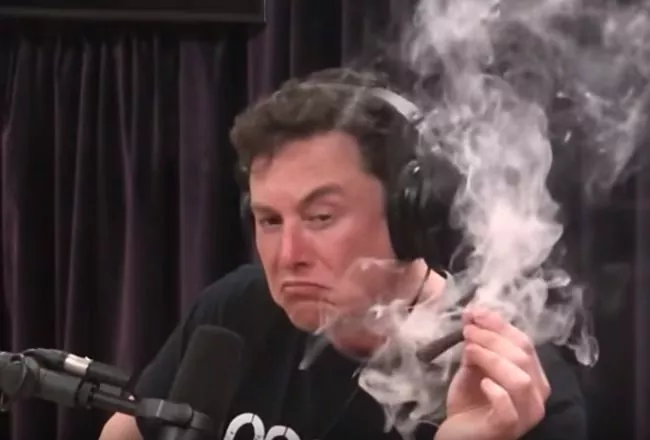Elon Musk's Reported Drug Use Rattles Tesla Board

Marijuana is legal in several states, and you can even order ketamine from a Facebook ad. What you do behind closed doors is, in most cases, your business, but what about if you’re the CEO of several companies with combined values in the hundreds of billions of dollars? That’s a question Tesla’s board members are facing, as CEO Elon Musk’s alleged drug use has been plastered across the internet and news stations everywhere.
Musk’s recreational drug use is said to include long-term use of ketamine, according to reporting from The Wall Street Journal. It also claimed that he took cocaine, ecstasy, LSD, and psychedelic mushrooms at private parties, where it’s reported that some attendees signed non-disclosure agreements. Of course, Musk wasn’t all that shy about drug use a few years back as he hit a blunt on camera during an episode of Joe Rogan’s podcast.
Legally, drug use could cause problems for Musk and his companies, as the government isn’t too keen on contracting with a company led by someone perceived to be irresponsible. Where you fall on the issue from an ethics standpoint depends mainly on how you feel about drug use in general. Personally, I couldn’t care less about what people do with their time.
Having said that, the bottom line question here is whether or not any of this nonsense affects his ability to run the handful of companies he’s responsible for. Even if it did not impact Musk’s ability to perform as a leader, negative public perception and potential business repercussions could be significant. No matter what Tesla’s board says about drug use, their focus is on profits and growth, and the moment Musk’s run down the K-hole jeopardizes that, he becomes a big problem.
[Image: YouTube]
Become a TTAC insider. Get the latest news, features, TTAC takes, and everything else that gets to the truth about cars first by subscribing to our newsletter.

Chris grew up in, under, and around cars, but took the long way around to becoming an automotive writer. After a career in technology consulting and a trip through business school, Chris began writing about the automotive industry as a way to reconnect with his passion and get behind the wheel of a new car every week. He focuses on taking complex industry stories and making them digestible by any reader. Just don’t expect him to stay away from high-mileage Porsches.
More by Chris Teague
Latest Car Reviews
Read moreLatest Product Reviews
Read moreRecent Comments
- 3-On-The-Tree Old news if it is even true. But from m my time as Firefighter/EMT fighting vehicle fires when it catches fire it is very toxic.
- Akear Chinese cars simply do not have the quality of their Japanese and Korean counterparts. Remember, there are also tariffs on Chinese cars.
- 3-On-The-Tree My experience with turbos is that they don’t give good mpg.
- GregLocock They will unless you don't let them. Every car manufacturing country around the world protects their local manufacturers by a mixture of legal and quasi legal measures. The exception was Australia which used to be able to design and manufacture every component in a car (slight exaggeration) and did so for many years protected by local design rules and enormous tariffs. In a fit of ideological purity the tariffs were removed and the industry went down the plughole, as predicted. This was followed by the precision machine shops who made the tooling, and then the aircraft maintenance business went because the machine shops were closed. Also of course many of the other suppliers closed.The Chinese have the following advantagesSlave laborCheap electricityZero respect for IPLong term planning
- MaintenanceCosts Yes, and our response is making it worse.In the rest of the world, all legacy brands are soon going to be what Volvo is today: a friendly Western name on products built more cheaply in China or in companies that are competing with China from the bottom on the cost side (Vietnam, India, etc.) This is already more or less the case in the Chinese market, will soon be the case in other Asian markets, and is eventually coming to the EU market.We are going to try to resist in the US market with politicians' crack - that is, tariffs. Economists don't really disagree on tariffs anymore. Their effect is to depress overall economic activity while sharply raising consumer prices in the tariff-imposing jurisdiction.The effect will be that we will mostly drive U.S.-built cars, but they will be inferior to those built in the rest of the world and will cost 3x-4x as much. Are you ready for your BMW X5 to be three versions old and cost $200k? Because on the current path that is what's coming. It may be overpriced crap that can't be sold in any other world market, but, hey, it was built in South Carolina.The right way to resist would be to try to form our own alliances with the low-cost producers, in which we open our markets to them while requiring adherence to basic labor and environmental standards. But Uncle Joe isn't quite ready to sign that kind of trade agreement, while the orange guy just wants to tell those countries to GFY and hitch up with China if they want a friend.


































Comments
Join the conversation
Well, you can abuse them just as much as anything else. Probably not as fun as shots or doobs.
He is a complete jackweed. I don't care about his drug use but he treats women in his life horribly and he allows far right wing nut jobs on X. I'll never use anything he produces.